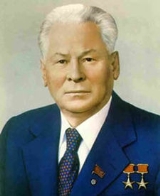
Konstantin Chernenko
Konstantin Ustinovich Chernenko (1911-09-24 - 1985-03-10) was the leader of the Soviet Union from February 1984 (after the death of Yuri Andropov) until his death. He was succeded by Mikhail Gorbachev.
Sourced
- Those who try to give us advice on matters of human rights do nothing but provoke an ironic smile among us. We will not permit anyone to interfere in our affairs.
- Quoted in "Simpson's contemporary quotations" - by James Beasley Simpson - Page 2
- If Soviet society is to move forward with confidence toward our great goals, each new generation must rise to an ever-higher level of learning and general cultivation, occupational skill and civic activism. One might say that such is the law of societal progress. In the context of the scientific and technological revolution, under a virtual avalanche of information, this law imposes unwontedly high demands on both those who study and those who teach—from rank-and-file classroom teachers to government ministers.
- Quoted in "Soviet Education" - Page 109 - by International Arts and Sciences Press, M.E. Sharpe, Inc - Education - 1958
- The Soviet Union has long been proposing to outlaw chemical weapons, to remove them from the arsenals of states. We are prepared for resolution of this problem either on a global basis or piece by piece. As one of the first steps the USSR and the other socialist countries proposed in January 1984 that agreement be reached on ridding Europe of all types of chemical weapons.
- Quoted in "World Peace and the Developing Countries" - Page 126 - by Joseph Rotblat, Ubiratan D'Ambrosio - 1986
- Washington's adventuristic policy, whipping up international tension to the utmost, is pushing mankind towards nuclear catastrophe.
- Quoted in "Speeches and Writings: Leaders of the World" - Page 186 - by Konstantin Ustinovich Chernenko - Political Science - 1984
- As a great socialist power the Soviet Union is fully aware of its responsibility to the peoples for preserving and strengthening peace. We are open to peaceful, mutually beneficial cooperation with states on all continents. We are for the peaceful settlement of all disputable international problems through serious, equal, and constructive talks.
- Quoted in "The Struggle of the USSR for Peace and Security" - Page 6 - History - 1984
- All this is forcing the USSR to fortify the nation's defences. The Soviet people want no arms build-up. What they want is arms reduction on both sides. But we are compelled to see to our country's essential security and also to that of our friends and allies. That is exactly what is being done. And we want everybody to remember that no adventure-seekers will ever succeed in catching us unawares, that no potential aggressor has the slightest chance of escaping a devastating retaliatory strike.
- Quoted in "Problems of Common Security" - Page 60 - by V. S. Shaposhnikov - 1984
About Chernenko
- Sverdlov Hall was already nearly full...The provincial elite were all there. And it was all the usual things: people kissing each other and shouting greetings across the rows of seats, chattering about the snow and the harvest prospects and generally feeling themselves to be masters of their fate. In all the cacophony I didn't hear the name of Andropov mentioned once, not anything said about his death. At twenty minutes to eleven the hall hushed. The waiting began. With each minute the tension rose and the atmosphere felt charged with electricity...The tension reached a climax. All eyes turned towards the door...Who would come through it first? At precisely eleven, Chernenko's head appeared in the doorway. He was followed by Tikhonov, Gromyko, Ustinov, Gorbachev and the rest. The delegates' reaction was silence.
- Anatoly Chernyayev, who was to become an aide to Gorbachev, has described the appointment of Chernenko at the special plenum of the Central Comittee on February 13, 1984.
- You know, comrades, that Konstantin Ustinovich has been gravely ill for a long time, and has been in the hospital in recent months. On the part of the Fourth Main Department, all necessary measures were taken in order to treat Konstantin Ustinovich. But the illness did not submit to the cure, it started to weaken his systems first slowly, and then faster and faster. It became especially aggravated as a result of pneumonia in both lungs, which Konstantin Ustinovich developed during his vacation in Kislovodsk. There were periods when we succeeded in alleviating the lung and heart insufficiencies, and during those periods Konstantin Ustinovich found enough strength to come to work. Several times he conducted Politburo sessions, and put in work days, although shortened ones. Emphysema of the lungs and the aggravated lung and heart insufficiency had worsened significantly in the last two or three weeks. Another, accompanying illness had developed—chronic hepatitis, i.e. liver failure with its transformation into cirrhosis. The cirrhosis of the liver and the worsening dystrophic changes in the organs and tissues led to the situation where not with standing intensive therapy, which was administered actively on a daily basis, the state of his health gradually deteriorated. On March 10 at 3:00 p.m., Konstantin Ustinovich lost consciousness, and at 19:20 death occurred as a result of heart failure.
- Yevgeni Chazov, spoken in a special session of the Central Committee one day after Chernenko died.
